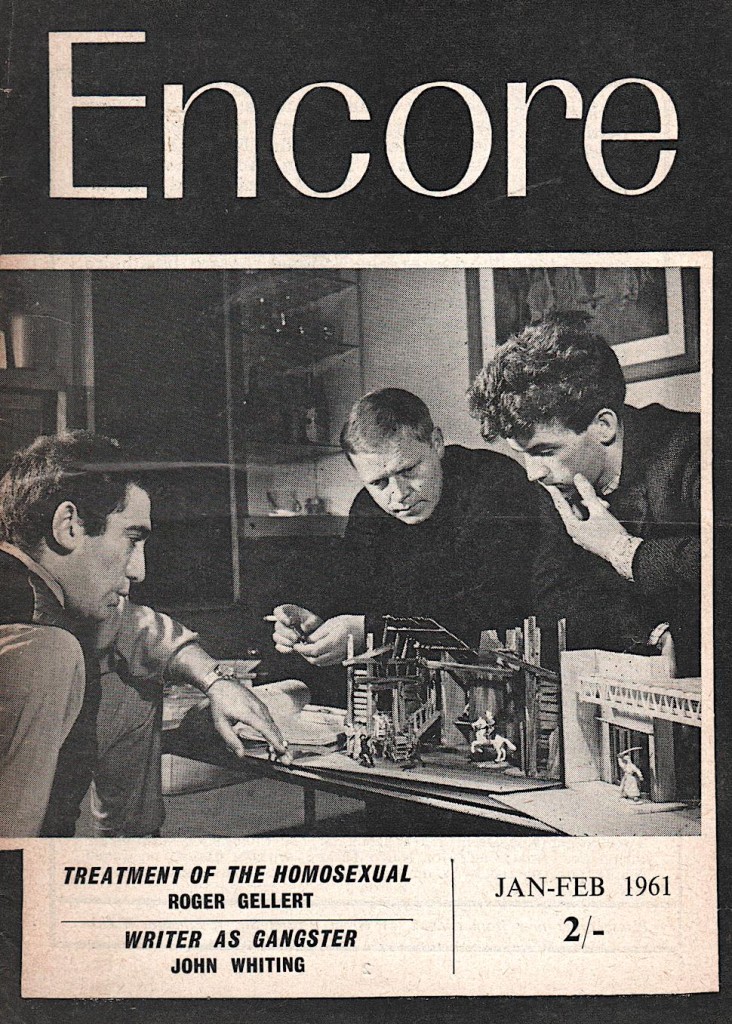 Six years before homosexual acts between consenting adults were legalised Encore, the ‘little magazine’ devoted to contemporary theatre, published in Jan-Feb 1961, a perceptive item by ‘Roger Gellert’ entitled ‘A Survey of the Treatment of the Homosexual in some plays’. Gellert was the pseudonym of the one-time Third Programme announcer John Holmstrom, who left the BBC to become a playwright and theatre critic, only to return as an announcer on Radio Three and a contributor to Test Match Special.
Six years before homosexual acts between consenting adults were legalised Encore, the ‘little magazine’ devoted to contemporary theatre, published in Jan-Feb 1961, a perceptive item by ‘Roger Gellert’ entitled ‘A Survey of the Treatment of the Homosexual in some plays’. Gellert was the pseudonym of the one-time Third Programme announcer John Holmstrom, who left the BBC to become a playwright and theatre critic, only to return as an announcer on Radio Three and a contributor to Test Match Special.
Encorewas just the sort of publication that you might expect to find such a radical item. It advertised itself as ‘ the voice of vital theatre ‘ and was edited by Clive Goodwin (1932 – 78 ), who in the previous year had also published essays on Arden, Pinter, Arthur Miller, Ionesco, Wesker, Negro Theatre and ‘ Billy Liar’. Goodwin, incidentally, was an actor and writer who was married for a short while to the tragic pioneer of Pop art, Pauline Boty.
Gellert’s approach to a subject that was still a ‘ problem ‘ for theatregoers in Western culture was to emphasise that to the ‘ bisexual ‘ Shakespeare, to Marlowe and the Restoration dramatists, homosexuality was regarded as something to be accepted and laughed at, rather than condemned as immoral. Then, after two hundred or more years of ‘ silence’ on the subject, the whole issue, according to Gellert, was resurrected with the staging of Mordaunt Shairp’s play of 1933, The Green Bay Tree, in which the audience is invited to laugh once more, this time at the extraordinary camp utterances of the gay protagonist, Mr Dulcimer, a sort of aesthete of the Oscar Wilde type, who grooms an innocent boy for his own amusement , but is shot dead as punishment for his decadence.
As Gellert argues, The Green Bay Treeis a shallow ‘entertainment ‘rather than a serious comment on the plight of homosexuals in society. That more sympathetic attitude emerged in the post war years with such plays as William Douglas Home’s Now, Barabbas, in which a rather pathetic ex-schoolmaster serving time for sex crimes pesters a young prisoner. Gellert also credits Arthur Miller’s View from the Bridge,Philip King’s Serious Charge, Lilian Hellman’s The Children’s Hourand Robert Anderson’s Tea and Sympathy, for airing serious issues around homo sexuality, though he accuses the latter of doing so at a ‘ very shallow level’. Continue reading
